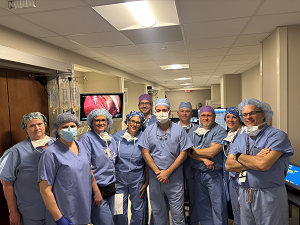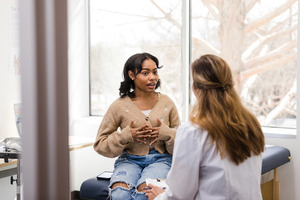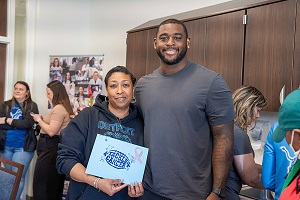Breast Cancer Empower Hour
Join this free weekly empowerment and education session specially designed for those with a breast cancer diagnosis. Connect with others on a...
Less than one percent of women will be diagnosed with vulvar cancer. While rare, vulvar cancer is very treatable, but can be difficult for women and families to talk about.
You deserve a care team that understands what you’re going through. At Henry Ford Cancer, you’ll find a team of specialists who will make your experience as comfortable as possible.
Our team carefully evaluates all aspects of your diagnosis, to create a treatment plan tailored to your unique needs. Our surgeons use the most advanced and minimally invasive surgical options whenever possible to promote healing and shorten your recovery time.
You’ll also have a dedicated cancer nurse navigator to support you so you know what to expect throughout your care and assist with appointment scheduling.
We offer the most advanced treatment options and innovative surgical techniques for vulvar cancer. Our experts will design a personalized treatment plan that will offer you the best possible care and outcome. Your treatment plan will be based on your cancer diagnosis, your unique health needs, and your concerns. It may consist of the following:
To tailor your treatment to your unique diagnosis and needs, we fight vulvar cancer using the expertise of a multidisciplinary team approach. Members on you team will include:
As personal and medical needs arise, our team will be there for you.
Join this free weekly empowerment and education session specially designed for those with a breast cancer diagnosis. Connect with others on a...
Learn tips and tools to handle the big feelings that often come after a cancer diagnosis. This FREE 5-week virtual educational series, taught by a...
Join Detroit Opera elite studio performers as they bring special opera and dance presentations into the hearts and homes of the Henry Ford...
This twice monthly group, facilitated by a professional counselor/social worker, offers patients an opportunity to express their feelings and...





Cancer can be a tricky subject to navigate. If a friend or family member is diagnosed, here's some advice on what to say and what not to say.

Think alcohol in moderation isn't so bad? Turns out, that's not quite true. Even less than one drink per day can increase the risk of certain cancers. Learn more.

Cervical cancer screenings are very important for women as young as 21. Learn why--along with cervical cancer risk factors and treatment methods.

Asking for help isn’t always easy, but if you have cancer, delegating tasks can make you and your support network feel better. Here’s how.
We use cookies to improve your website experience. By using this site, you agree to our Terms of Use. Read our Internet Privacy Statement to learn what information we collect and how we use it.